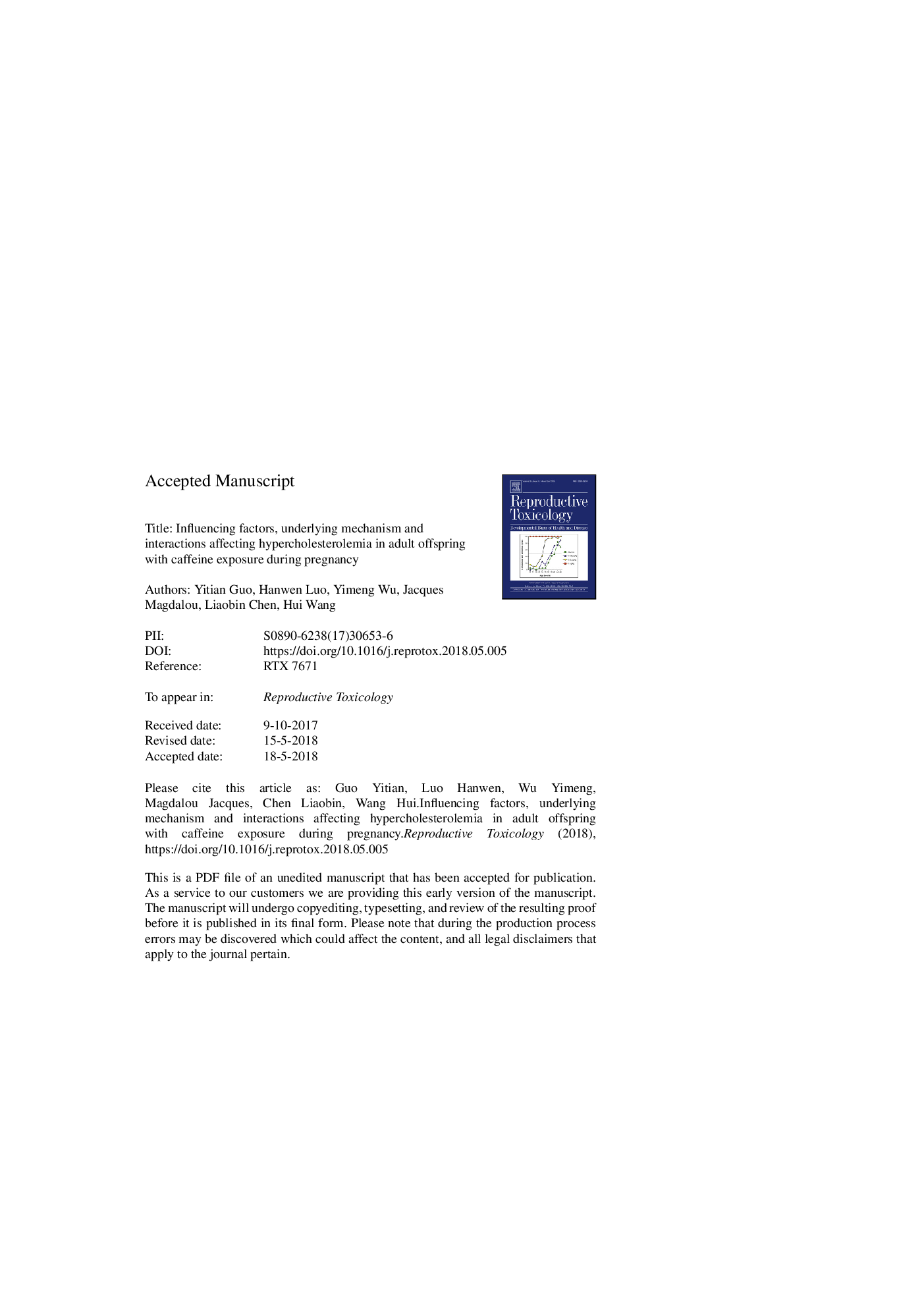| کد مقاله | کد نشریه | سال انتشار | مقاله انگلیسی | نسخه تمام متن |
|---|---|---|---|---|
| 8552142 | 1562140 | 2018 | 22 صفحه PDF | دانلود رایگان |
عنوان انگلیسی مقاله ISI
Influencing factors, underlying mechanism and interactions affecting hypercholesterolemia in adult offspring with caffeine exposure during pregnancy
ترجمه فارسی عنوان
عوامل تاثیر گذار، مکانیزم پایه و تعاملات تاثیر گذار بر هیپرکلسترولمی در پسران بالغ با قرار گرفتن در معرض کافئین در دوران بارداری
دانلود مقاله + سفارش ترجمه
دانلود مقاله ISI انگلیسی
رایگان برای ایرانیان
کلمات کلیدی
قرار گرفتن در معرض کافئین پیش از قاعدگی، رژیم غذایی با چربی بالا، جنسیت، عقب ماندگی رشد داخل رحمی، گلوکوکورتیکوئید مادر هیپرکلسترولمی
موضوعات مرتبط
علوم زیستی و بیوفناوری
علوم محیط زیست
بهداشت، سم شناسی و جهش زایی
چکیده انگلیسی
Epidemiological surveys suggest that adult hypercholesterolemia has an intrauterine origin and exhibits gender differences. Our previous study demonstrated that adult rats with intrauterine growth retardation (IUGR) offspring rats induced by prenatal caffeine exposure (PCE) had a higher serum total cholesterol (TCH) level. In this study, we aimed to analyze the influencing factors, underlying mechanism and interactions affecting hypercholesterolemia in adult offspring with caffeine exposure during pregnancy. Pregnant rats were administered caffeine (120â¯mg/kgâ¯d) from gestational day 11 until delivery. Offspring rats fed a normal diet or a high-fat diet (HFD) were euthanized at postnatal week 24, and blood and liver samples were collected. The results showed that PCE could increase the serum levels of TCH and low-density lipoprotein-cholesterol (LDL-C), and the hepatic expression of HMG CoA reductase (HMGCR) and apolipoprotein B (ApoB), but decreased the high-density lipoprotein-cholesterol (HDL-C) level and the hepatic expression of scavenger receptor B1 (SR-B1) and LDL receptor (LDLR). Furthermore, PCE, HFD and gender interact with each other to influence the serum cholesterol phenotype and expression of hepatic cholesterol metabolic genes. These results suggest that the hypercholesterolemia in adult offspring rats induced by PCE mainly resulted from enhanced synthesis and the weakened reverse transport of cholesterol in the liver, furthermore HFD could aggravate this effect, which is caused by hepatic cholesterol metabolic disorders. Moreover, cholesterol metabolism in female rats was more sensitive to neuroendocrine changes and HFD than that in males. This study confirmed the influencing factors (such as a HFD and female gender) of hypercholesterolemia in IUGR offspring providing theoretical and experimental bases for the effective prevention of fetal-originated hypercholesterolemia.
ناشر
Database: Elsevier - ScienceDirect (ساینس دایرکت)
Journal: Reproductive Toxicology - Volume 79, August 2018, Pages 47-56
Journal: Reproductive Toxicology - Volume 79, August 2018, Pages 47-56
نویسندگان
Yitian Guo, Hanwen Luo, Yimeng Wu, Jacques Magdalou, Liaobin Chen, Hui Wang,
